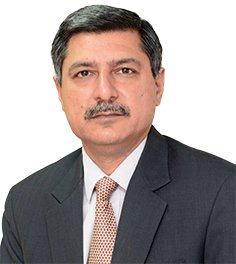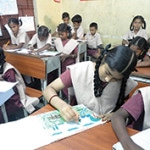

CEO, NABET talks about
creating a structured
assessment
Creating a mechanism to accredit Skill education and training is necessary to build an ecosystem for empowering the youth with global skills requirement as well as employable skills in Make in India regime. Vipin Sahni, CEO, National Accreditation Board for Education and Training (NABET) tells Bhawna Satsangi of Elets News Network (ENN) how the organisation has repositioned its role in the formal and non-formal education to scale up the activities in education sector
What are the initiatives under NABET focusing on skill development?
The formation of Quality Council of India was done on the principles of creating a third party assessment structure – a national accreditation structure for international acceptability. One, of course was the general standards and conformity assessment arena. But, the other area which would be the foundation stone for our country to grow and reach at the international standards progressively through voluntary accreditation is education and training. With that perspective it was thought that we should have a separate board or an accreditation board which can create an ecosystem for providing quality services to the masses in education and skills domain.
You may be aware, that NABET is one of the biggest boards under QCI in terms of its reach, activities, growth as well as the impact it has on the total population of youth in India. The role of education has become more important because of the huge demographic potential that India possesses, which needs to be converted into a dividend not only for India but also for the world. These youth are also expected to take up employment internationally to meet the needs of the various economies around the world. To give you an idea, there are about more than one and a half million schools and GER of only 21% and more than 30 million people in tertiary education in India every year.
Whereas, the government has been spending lot of money in creating new institutions in order to provide access to education and skill training. The fast changing industrial environment in India and abroad has rendered the existing skill set a very short shelf life. Our education system and for that matter around the world has not been able to cope up with the skill set required for a global and fast changing work place. There are issues of employability, working in a multicultural work environment, working with pleasure without stress, training of teachers, holistic development of educational professional, peer learning, ICT based learning, and skill training etc.
All these areas of major concern are being addressed within a very tight framework and fortunately the present government has given lot of emphasis on skill training, which is likely to become a vehicle for economic development and leadership that India craves to establish in the world through its human resource potential. NABET has made an extremely visionary plan to address all these issues in a time bound manner.
Formal education is the basic ingredient or the foundation for any holistic development. Within this ecosystem, NABET is creating a structured assessment, rating and maturity model for institutionalization and linkages with the international benchmarks.
Please throw light on NABET structure.
We have five different verticals within NABET. It is the national accreditation body for the industrial training institutes – the ITIs, National Council for Vocational Training (NCVT), Government of India has made it mandatory for all institutes to first seek NABET accreditation for NCVT affiliation.
The process of accreditation is based on the principles of third party assessment.We work as a supporting arm to various government initiatives at central or state level and ensure the quality parameters in all education and skills related activities.
We also seek to accredit personal certification bodies which verify the competencies of professionals. Very soon this will become a mechanism for cross border movement of professionals from our country into different countries. The companies today are asking for certified professionals globally.
NABET is also working in a major way with Micro Small and Medium Enterprises (MSME) and creating a kind of supporting mechanism through Quality initiatives. NABET is the National Monitoring and Implementing Unit for Lean Manufacturing Competitiveness scheme with Ministry of MSME.
NABET is also accrediting schools in formal education, a voluntary standard as of now. The standard is very well accepted in private, government and schools abroad. A number of schools in the Middle East are also coming for NABET accreditation.
We are also working on the accreditation of environment impact assessment consultant organisations who take up developmental projects in India wherein NABET is working in close cooperation with Ministry of Environment, Forest and Climate change. For preparing EIA reports, the consulting organisations have to be NABET accredited.
On what parameters do you decide the accreditation?
In certain areas there are process standards like ISO 9000 standards or 14000 standards which are embedded. Even for certification of non-formal training institutes, there is ISO 29990 standard. The bodies which are certifying the competencies of professionals there is a standard called ISO 17024. We as an accreditation body also have to meet the standard 17011 and there’s an international accreditation forum (IAF) of which Quality Council of India is a member. Wherever there are multilateral agreements, we try to be a signatory to those agreements.
Except for higher education wherein we have Washington accord, for schools and vocational training’s there are no multilateral agreements at present around the world. We are signing bilateral agreements with similar bodies around the world so that at least by the time these multi-lateral agreements come, we have certain mechanism which enables our workforce to be acceptable internationally.
We try to pick up the best practices from across the world and circulate criteria that we develop to all our stakeholders and other internationally to ensure that we are on the same lines. The objective is to create an enabling mechanism so that total ecosystem that we are trying to create gets evolved over a period of time.
How NABET is embracing technology?
Technology is the backbone in all of our activities. We have used technology to create certain environments that it reaches to a person even in a rural belt. Today, fortunately technology has given us all those options. All the accreditation mechanism that we are setting up, we are creating total online mechanism wherein institute has to apply online. We try to create all the mechanisms to support the applicants. Technology is also cutting short the time of accreditation through which we have reduced the time period of more than a year for approvals to 3-4 months. This year we have received more than 4000 applications for ITI accreditation because of easy accessibility and clarity of the criteria.
What are the other activities that NABET is working on?
We are looking at creating an ecosystem where we help SMEs in quality parameters to create their capabilities so that when international companies set up establishments in India, they are able to get the quality of resources that they desire. It will also provide ample opportunities to students who are coming out of technical institutes in jobs related to manufacturing quality.
We have created a ZED model (Zero Defect Zero Effect Maturity Model) for MSMEs. Department of Industrial Policy and Promotion, Ministry of Commerce and Industry are supporting this initiative.
Just imagine through this if a SME is able to create even one more job, there would be an immediate creation of 40- 50 million employment opportunity for youth only in the SME sector. We are not only imagining but striving to create an ecosystem to support the “Make in India” call of Prime Minister Narendra Modi.





















